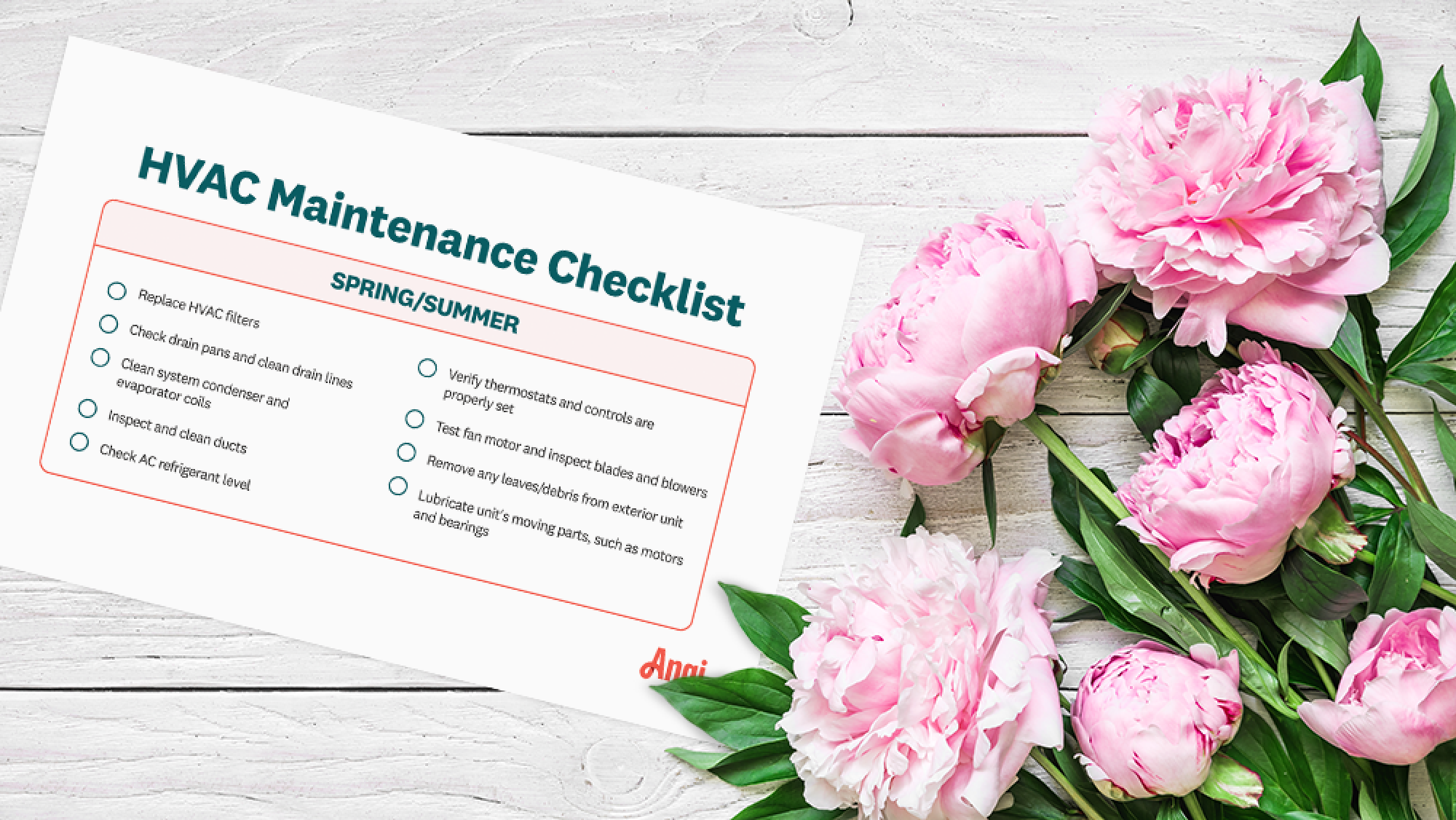Your Complete HVAC Maintenance Checklist
Learn how to maintain your HVAC system so you can stay comfortable all year long


Your HVAC is among the most important systems in your home, keeping you comfortable in the blistering summer heat all the way through the frigid winters. But like many other systems in the home, it requires regular maintenance to continue running as it should. Fortunately, maintaining your system is fairly simple and straightforward. Read on for a complete HVAC maintenance checklist you can use to ensure your system works when you need it most.
Scheduling an HVAC inspection every six months is crucial for ensuring your system operates efficiently and safely, preventing unexpected breakdowns and costly repairs. Regular inspections can also extend the lifespan of your system, providing comfort and peace of mind throughout the year.
Preventive HVAC Maintenance Checklist
It’s easy to forget how important it is to maintain your HVAC system throughout the year until your electricity or gas bill arrives. Outside of the items on your checklist, there are some other DIY maintenance tasks you can take on—starting right now—to make sure your system is performing at its highest potential throughout the year.
Check your air filters once a month to see if they need to be changed, and then change them when they do (at the very least, change them twice per year).
Keep your indoor vents clear of debris by dusting them regularly.
Blow or wash dust and debris off your outdoor units when it builds up and take care to keep your mower from blowing debris directly into the system.
Add shade over your outdoor compressor (like an umbrella or awning) to help maximize its efficiency during the summer.
Use fans instead of AC whenever possible to help reduce pressure on your system.
When turning off your AC for the season, clean your drain and evaporator coil with water and bleach to help prevent algae and mold.
Turn your furnace’s humidifier off during the summer and replace the humidifier pad before starting it back up in the fall or winter.
If you want to get all of your HVAC maintenance done promptly but don’t have the time to do it yourself, consider enrolling in an HVAC tune-up plan from a local company. These plans usually include maintenance and service on key items, including an AC inspection and a furnace tune-up, that can help catch small issues before they become big (and expensive) problems. They’re an investment, but some find that HVAC maintenance plans are worth the cost.
Spring and Summer HVAC Maintenance Checklist

Download the Spring/Summer HVAC Maintenance Checklist
Spring is the perfect time to ensure your HVAC system is in tip-top shape for the hot summer months ahead. Considering your AC will be doing the heavy lifting during this time, it should also get the most love during your spring maintenance session.
Replace all of your HVAC system's filters.
Clean your drain lines and remove any clogs.
Clean your system's condenser and evaporator coils.
Check drain pans and remove any standing water.
Inspect and clean your ducts, removing any dust, mold, or other debris.
Check the air conditioner's refrigerant level and modify it if needed.
Verify that your thermostats and controls are properly set and fully charged.
Test the fan motor and inspect its blades and blowers to ensure it's operating as intended.
Make sure there aren't any leaks in the HVAC cabinet and that the cabinet door is secure.
If the unit is outdoors, remove any leaves or debris from around it.
Check all the unit's belts and pulleys, replacing any that are frayed or show other signs of wear.
Lubricate all the unit's moving parts, such as motors and bearing.
Hire a professional to perform an annual AC inspection.
Depending on your skill level, you can perform some or all of the following tasks on this HVAC preventive maintenance checklist. However, if you're unsure about how to complete any of these steps, it's a good idea to hire an HVAC expert to help. The average HVAC maintenance cost for an AC tune-up runs between $450 and $1,000, depending on its size and condition.
Fall and Winter HVAC Maintenance Checklist

Download the Fall/Winter HVAC Maintenance Checklist
The changing fall leaves mean cold winter days are just around the corner, so it's another great time to give your HVAC system a tune-up. This list is similar to the spring checklist, but it focuses more on your heating system since that's the one that will be working hard to keep you warm all winter long.
Replace your filters and plan to replace them every 30 to 90 days throughout the winter, depending on how dirty they get.
Inspect all the heating elements for damage.
Ensure the flue system is properly attached to the furnace.
Inspect belts and pulleys for any damage and replace them as needed.
If you have a gas furnace, call a technician to check for gas leaks and any pressure problems.
Remove any standing water from drain pans.
Inspect your wiring and electrical connections for damage.
Make sure the heat pump is working properly.
Lubricate all moving parts, like motors and bearings.
Ensure your HVAC controls and thermostat are set the way you want them to be.
Like the spring checklist, you can technically perform these tasks yourself, but if you're unsure about how to complete any of them, you should call a pro to come help you.
How Often Should I Maintain My HVAC System?
It's a good idea to perform maintenance on your HVAC system at least twice per year—once during the spring before the hot days of summer hit and once during the fall in anticipation of the cold winter. The exact steps you take during each maintenance season will vary slightly depending on if you're focusing on the cooling or heating system, but they're similar overall.
Why Should I Perform Regular HVAC Maintenance?

It's easy to neglect HVAC maintenance, especially if you don't notice any problems with it. But performing regular maintenance on your system can save you a lot of money and help you avoid having to invest in the cost of replacing your HVAC system before it reaches its full potential.
Lower Energy Bills
A poorly maintained HVAC system begins to lose its efficiency, which means it needs to work harder to heat and cool your home. As a result, you may start to see spikes in your monthly energy bills.
Fewer Costly Repairs
Even the best-maintained HVAC systems usually require some repairs over time, but maintaining your system regularly allows you to see potential problems before they get out of hand. And the sooner a local HVAC repair pro can address the problem, the less expensive the repair is likely to be.
Longer Equipment Life Span
Speaking of expenses, HVAC systems can be mighty pricey, but if you take the time to maintain your system regularly, then you'll likely prolong its life span. This lets you avoid spending money on a brand-new system for as long as possible.
Improved Air Quality
Your HVAC system has filters in it that help remove dust, mold, and other particles from the air. When these filters aren't changed (such as when your HVAC system isn't maintained), then you end up breathing in all those particles, which can exacerbate allergies and other health issues.
Frequently Asked Questions
HVAC maintenance takes one to two hours for a pro to complete every task. The actual time it’ll take will depend on the size of your HVAC system, whether it’s been regularly maintained, and if your tech identifies any repairs that need addressing. If you decide to DIY your HVAC maintenance, the process will likely take longer.
If you don't change your HVAC air filters, you'll start to see some negative side effects in the way your HVAC system operates. Your filters will get too dirty to do their job correctly, meaning all the dirt and dust that the filter is supposed to catch will move through your HVAC system. You may notice signs of decline, such as your HVAC working slowly, your utility bills getting higher even though your usage is the same, bad air quality, and system failure.
HVAC systems last around 10 to 30 years. If you complete the recommended maintenance, you can expect your system to reach its maximum life span. The life span also depends on the type of HVAC system. Heat pumps last about 10 to 15 years, AC units last about 15 to 20 years, and furnaces last around 15 to 30 years. Boilers have the longest life span, as they last around 20 to 30 years.
A dirty AC filter can lower the efficiency of your system, so depending on how dirty it was, you may notice a temperature difference when you clean your filter. You can try other solutions if your AC isn’t blowing as cold as it used to. You can call in a local HVAC tech to make sure everything is running correctly, fix your air seal if it’s a window unit, and clean your coils.





- Furnace Repair
- Air Conditioning Repair
- HVAC Repairs
- Furnace Installation
- Wood & Pellet Stove Repair
- Dehumidifier & Humidifier Repair
- Heat Pump Companies
- Swamp Cooler Repair
- Wood Stove Services
- HVAC Companies
- Commercial A/C Repair
- Geothermal Installation
- Air Conditioning Installation
- Boiler Repair
- 24 Hour Furnace Repair
- Geothermal Repair
- Heat Pump Repair
- Humidifier Installation
- Thermostat Repair
- Thermostat Installation
- Nest Installation
- Heating & Cooling
- Heating Repair
- Furnace Cleaning
- Furnace Tune-Up
- HVAC Technicians
- Subcontractors
- Furnace Maintenance
- Plumbing & Heating Companies
- Wood Stove Inspection
- Mini Split Installation
- Wall Heater Repair
- Duct Installers











